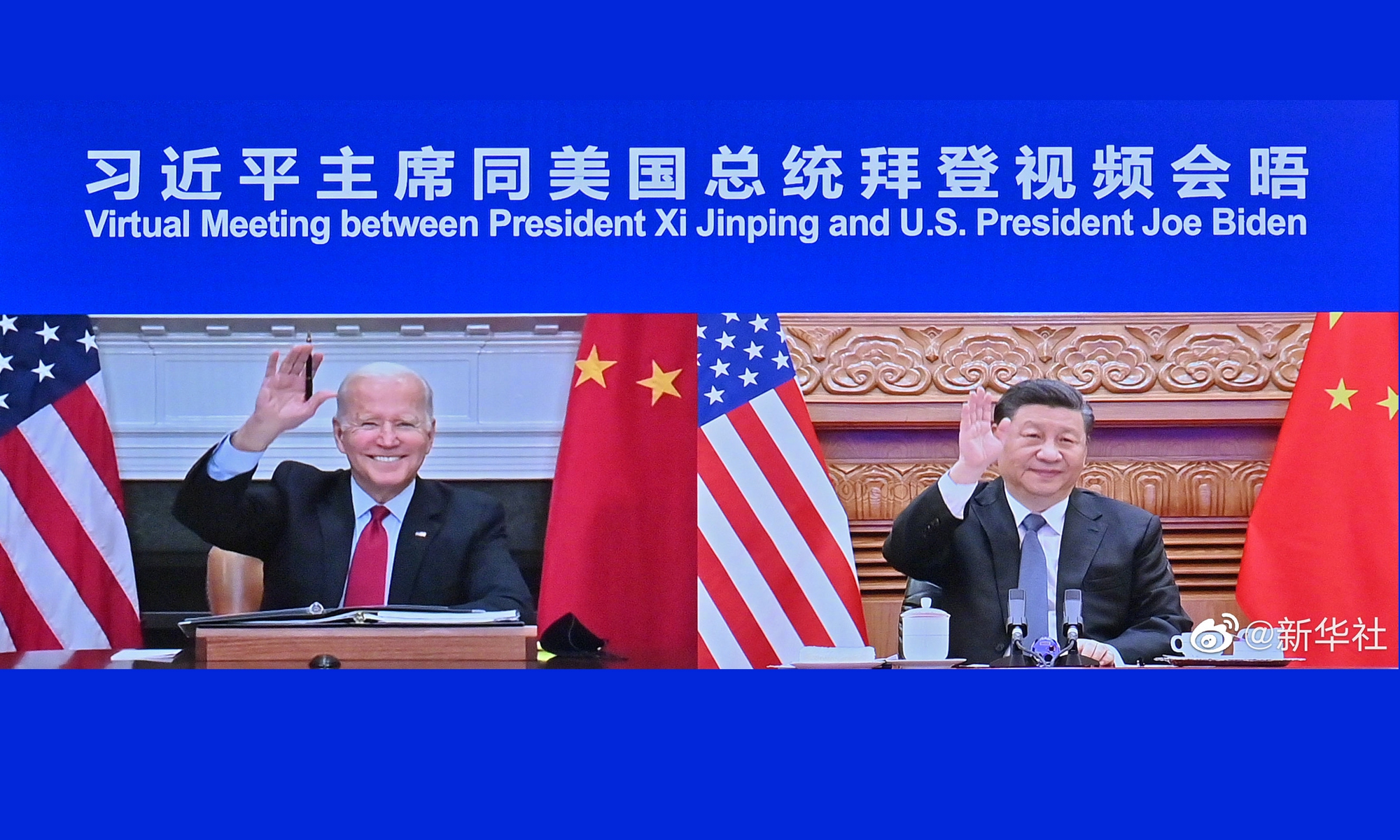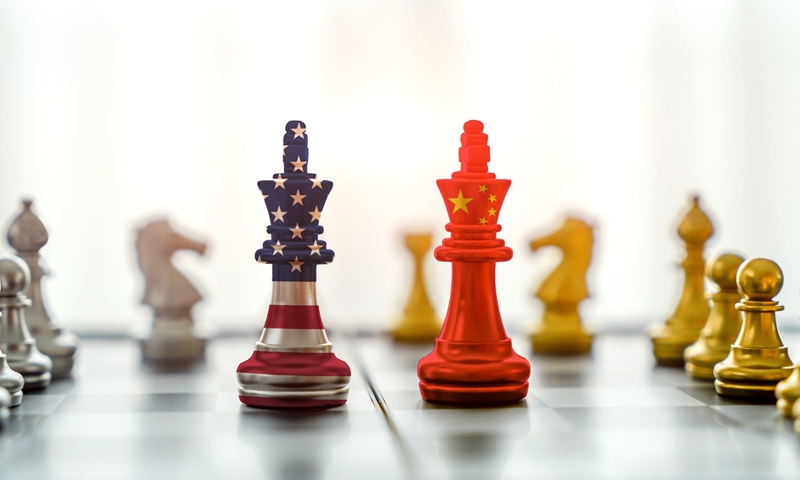
Chinese President Xi Jinping met with US President Joe Biden on Tuesday morning (Beijing time), the first face-to-face meeting virtually since Biden took office. (Photo: Xinhua)
Chinese President Xi Jinping had thorough and in-depth communication and exchanges with US President Joe Biden in a rare long virtual meeting on Tuesday morning (Beijing time) during which they discussed strategic, overarching and fundamental issues on bilateral relations.
The first face-to-face virtual meeting between the top two leaders lasted three hours and a half after they opened their talks on a friendly note. Chinese observers said that the meeting will inject certainty into the bilateral ties and is sending a signal that the two countries will cooperate in many areas despite they could not avoid fierce competition, and the fact that they are trying to manage competition is itself a positive sign for the world.
A video released by China Central Television showed that Xi hailed Biden as an old friend in the opening remarks, saying that he was very happy to see his old friend and it's crucial for China and the US to work together in addressing common challenges.
Both China and the US are at critical stages of development, and the "global village" of humanity faces multiple challenges, the Chinese president said.
As the world's two largest economies and permanent members of the UN Security Council, China and the US need to increase communication and cooperation, each run their domestic affairs well and, at the same time, shoulder their share of international responsibilities, and work together to advance the noble cause of world peace and development, Xi told Biden.
A sound and steady China-US relationship is needed for advancing the two countries' respective development and for safeguarding a peaceful and stable international environment, including finding effective responses to global challenges such as climate change and the COVID-19 pandemic, Xi stressed.
"China and the US should respect each other, coexist in peace, and pursue win-win cooperation," he said, expressing his readiness to work with Biden to build consensus and take active steps to move China-US relations forward in a positive direction.
The Chinese President laid out three principles and four priority areas for the China-US relations. In terms of principles, the two countries firstly need to respect each other's social systems and development paths, respect each other's core interests and major concerns, and respect each other's right to development.
They also need to treat each other as equals, keep differences under control, and seek common ground while reserving differences. The other two principles include peaceful coexistence and win-win cooperation. No conflict and no confrontation is a line that both sides must hold, the Chinese President said.
The US side has suggested coexistence between China and the US. One more word can be added to make it peaceful coexistence, Xi said. With their interests deeply intertwined, China and the US stand to gain from cooperation and lose from confrontation.
The world is big enough for the two countries to develop individually and collectively. The right thing to do is to choose mutual benefit over zero-sum game or the I-win-you-lose approach, Xi said.

Photo:Xinhua
The most important event in international relations in the coming 50 years will be for China and the US to find the right way to get along. History is a fair judge. What a statesman does, be it right or wrong, be it an accomplishment or a failure, will all be recorded by history. It is hoped that President Biden will demonstrate political leadership and steer US' China policy back on the track of reason and pragmatism, Xi said.
Biden told Xi that he was looking forward to a "candid and forthright discussion" as in the past and he believed it is the responsibility of the two countries' top leaders to ensure "the competition between our countries does not veer into conflict."
We need to build the guardrail of commonsense, be clear and honest about our differences, and work together on areas of mutual interest, especially on major global issues like climate change. The relationship between our two countries has a huge impact not only on our two countries, but on the whole world, Biden said.
While Biden insisting that the US is not seeking a new cold war, Xi said he hopes that the US can meet its word of not seeking a "new Cold War" with concrete actions.
While Biden made three promises, including not seek to change China's system, the revitalization of its alliances is not anti-China and have no intention to have clash with China, Xi expressed hope for the US to fulfill its promises.
In terms of four priority areas, Xi stressed that the two countries should shoulder responsibilities of major countries and lead global response to outstanding challenges, and act in the spirit of equality and mutual benefit to move forward exchanges at all levels and in all areas and generate more positive energy for China-US relations.
Also, the two countries need to manage differences and sensitive issues in a constructive way to prevent China-US relations from getting derailed or out of control, and strengthen coordination and cooperation on major international and regional hotspot issues to provide more public goods to the world.
The atmosphere of the meeting, to some extent, reflected a pretty good personal relationship between the two leaders, which has already been underscored in the previous phone calls, Wu Xinbo, dean of the Institute of International Studies at Fudan University, told the Global Times on Tuesday.
"It's also rare for heads of state to have such a long conversation, and such a good relationship is seen as a positive condition for handling bilateral ties," Wu said.
The virtual summit could enhance political trust between the two countries, which plays an important role for current and future development of bilateral relations and it's conducive for improving the atmosphere of bilateral relations, he continued.
The China-US relationship is undoubtedly the most important relationship between major powers in today's international relations. The ongoing virtual summit is sending a signal to the world that China and the US will cooperate in many areas despite they could not avoid fierce competition, according to Chinese experts.
"The fact that China and the US are trying to manage competition is itself a positive sign for the world," Wu said.
On the Taiwan question, Xi said we have the patience and will strive for the prospect of peaceful reunification with utmost sincerity and efforts. But if the separatist forces for "Taiwan independence" provoke us, force our hands or even cross the red line, we will be compelled to take resolute measures, Xi said.
The US President reaffirmed the US government's long-standing one-China policy, stated that the US does not support "Taiwan independence", and expressed the hope for peace and stability to be maintained in the Taiwan Straits.
The virtual meeting was held during the working hours in China but late night in the US, which clearly shows which side is more eager. From the interactions in Anchorage in Alaska in March, to Tianjin in China in July and Zurich in Switzerland in October, China gradually has the initiative of the bilateral relations. The era for the US to unilaterally define the bilateral ties has ended and the two countries have entered into a period of equal and fair dialogue, Wang Dong, an expert on China-US relations at Peking University, told the Global Times.
The first half of the virtual meeting finished at 10:45 am after two hours of exchanging views on issues of common concern.
Ding Xuexiang, a member of the Political Bureau of the CPC Central Committee and director of the General Office of the CPC Central Committee, Chinese Vice Premier Liu He, Yang Jiechi, a member of the Political Bureau of the CPC Central Committee and director of the Office of the Foreign Affairs Commission of the CPC Central Committee, Chinese State Councilor and Foreign Minister Wang Yi as well as Vice Foreign Minister Xie Feng are among the attendees to the meeting.
Treasury Secretary Janet Yellen, US Secretary of State Antony Blinken, US National Security Advisor Jake Sullivan, White House Asia adviser Kurt Campbell and Laura Rosenberger, a US foreign policy veteran are among the US officials to the meeting, according to media reports.
The top leaders had spoken twice over the phone, in February and September.
The meeting, which lasted for rarely long of three hours and a half, concluded at 12:24 Tuesday noon Beijing time, which is midnight in Washington.




No comments:
Post a Comment